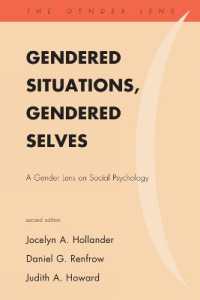- ホーム
- > 洋書
- > 英文書
- > Philosophy
Full Description
There must be some connection between our deontic notions, rightness and wrongness, and our responsibility notions, praise- and blameworthiness. Yet traditional approaches to each set of concepts tend to take the other set for granted. This book takes an integrated approach to these questions, drawing on both ethics and responsibility theory, and thereby illuminating both sets of concepts. Elinor Mason describes this as 'normative responsibility theory': the primary aim is not to give an account of the conditions of agency, but to give an account of what sort of wrong action makes blame fitting. She presents a pluralistic view of both obligation and blameworthiness, identifying three different ways to be blameworthy, corresponding to different ways of acting wrongly. First, ordinary blameworthiness is essentially connected to subjective wrongness, to acting wrongly by one's own lights. Subjective obligation, and ordinary blame, apply only to those who are within our moral community, who understand and share our value system. By contrast, detached blame can apply even when the agent is outside our moral community, and has no sense that her act is morally wrong. In detached blame, the blame rather than the blameworthiness is fundamental. Finally, agents can take responsibility for some inadvertent wrongs, and thus become responsible. This third sort of blameworthiness, 'extended blameworthiness', applies when the agent understands the objective wrongness of her act, but has no bad will. In such cases, the social context may be such that the agent should take responsibility, and accept ordinary blame from the wronged party.
Contents
1: Introduction
2: Subjective Obligation
3: Trying to do Well by Morality
4: Ordinary Praiseworthiness and Blameworthiness
5: Praise and Blame
6: Excuses
7: Exemptions
8: Taking Responsibility








